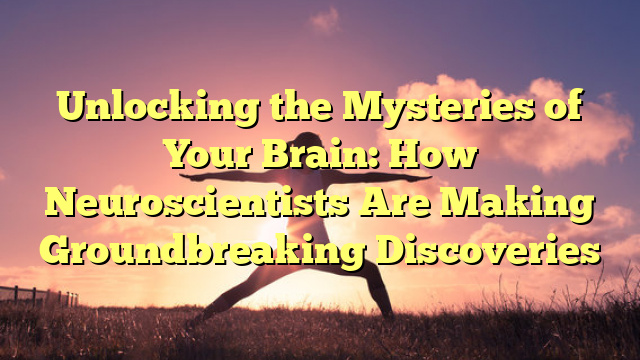The human brain is one of the most complex and fascinating organs in the body. For centuries, scientists and researchers have been trying to unlock its mysteries and understand how it works. Thanks to advancements in technology and research methods, neuroscientists are now making groundbreaking discoveries that are shedding light on the inner workings of the brain.
The Brain: A Complex Network of Neurons
At the core of the brain’s function are neurons, specialized cells that transmit information through electrical and chemical signals. These neurons form intricate networks that allow us to think, feel, and interact with the world around us. Neuroscientists have long been fascinated by the complexities of these networks and how they give rise to our thoughts, emotions, and behaviors.
Mapping the Brain
One of the key challenges in understanding the brain is mapping its intricate connections. Advances in imaging technology, such as functional magnetic resonance imaging (fMRI) and diffusion tensor imaging (DTI), have enabled researchers to create detailed maps of the brain’s structure and activity. These maps are helping neuroscientists identify key regions of the brain that are involved in specific functions, such as language processing, memory, and emotion.
Neuroplasticity: The Brain’s Ability to Adapt and Change
Another groundbreaking discovery in neuroscience is the concept of neuroplasticity – the brain’s remarkable ability to reorganize itself in response to new experiences. Research has shown that the brain can form new connections, rewire existing ones, and even generate new neurons throughout life. This ability to adapt and change is fundamental to learning, memory, and recovery from injury.
Brain Disorders and Therapies
Neuroscientists are also making significant strides in understanding and treating brain disorders, such as Alzheimer’s disease, Parkinson’s disease, and schizophrenia. By studying the underlying mechanisms of these disorders, researchers are developing new therapies and interventions that target specific brain circuits and pathways. These advances have the potential to improve the lives of millions of people affected by neurological and psychiatric conditions.
Conclusion
The field of neuroscience is a rapidly evolving and exciting area of research that is unlocking the mysteries of the human brain. Through groundbreaking discoveries in neuroplasticity, brain mapping, and the development of new therapies, neuroscientists are paving the way for a better understanding of how our brains work and how we can improve brain health and function. As technology continues to advance and research methods become more sophisticated, we can expect even more exciting discoveries in the field of neuroscience in the years to come.
FAQs
What is neuroscience?
Neuroscience is the scientific study of the nervous system, including the brain, spinal cord, and peripheral nerves. It encompasses a wide range of disciplines, including biology, psychology, and computer science, and seeks to understand how these systems work together to regulate our thoughts, emotions, and behaviors.
How do neuroscientists study the brain?
Neuroscientists use a variety of tools and techniques to study the brain, including brain imaging, electrophysiology, and molecular biology. These methods allow researchers to observe neural activity, measure neurotransmitter levels, and identify specific brain regions involved in various functions.
What is neuroplasticity?
Neuroplasticity is the brain’s ability to reorganize itself in response to new experiences. This phenomenon allows the brain to form new connections, rewire existing ones, and even generate new neurons, leading to changes in behavior, learning, and memory.
Unlock Your Mental Potential



